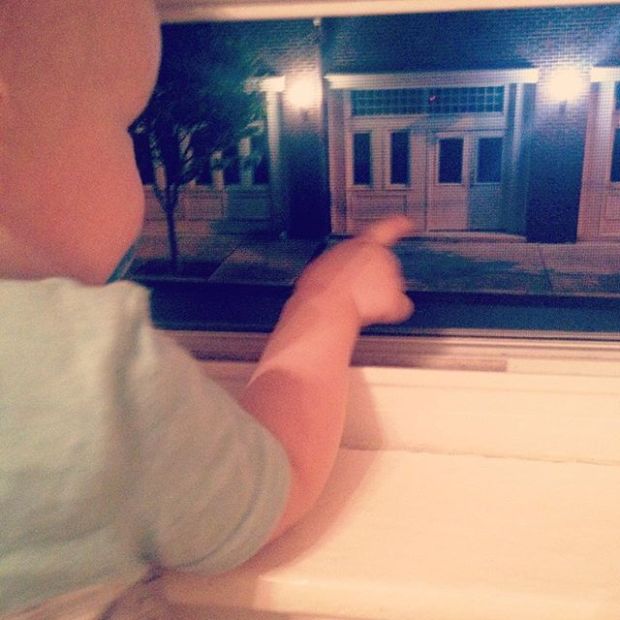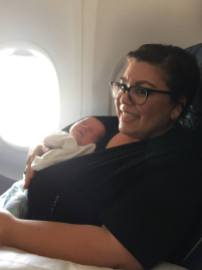Today I was looking out the window with my son, watching the orb lights come on across the street thinking about how lucky we are to live where we do. We just moved out of the country and into a town where there are infinitely more activities and everything is within walking distance. It really builds a sense of community. When I was 25, I wouldn’t have dreamed of moving to such a tourist trap because I was busy romanticizing the dirty streets of the adjacent town, hoping we’d be able to start a collective house and spend our time with like-minded, enjoyable people. All efforts fell on deaf ears or failed right out of the gate because in reality, the town we romanticized so much had nothing to do but drink and eat, otherwise not exactly a place to grow community. So we retreated to the country, to grow vegetables and have loud parties.
The idea of being a parent occurred to me off and on, but when I found out I was pregnant, I hadn’t been trying to conceive. The bundle of cells rolling around inside of me suddenly made the drunken nights and careless attitudes seem trivial and pointless. Now it was important to have a safe place to live with engaging activities, playgrounds, sidewalks, and opportunities to grow. That last bit really got to me because I realized after spending many years neglecting my own need for progression, it never occurred to me to keep fighting that fight. Now I wanted more for my child and more for myself as a person, for both of us, as individuals; it was a weird lightbulb moment.
As parents, our role is to act as an advocate for our child as well as ourselves because while we are a parent, we are still our own person (even if it doesn’t feel like it sometimes). Self-care is hard to prioritize and maybe I’m “privileged” for mentioning it, but damn, the past few weeks I have taken time to read books written by other “punk” or “alternative” parents and I have to say, what a breath of fresh air!

3-4 weeks of reading and inspiration
Who needs another book of parenting advice that just makes you feel like an impossibly shitty parent? Not me. I want a book that’s going to remind me that I’m fucking alive, that honors my role as a mother but reminds me that I am a fierce, creative, breathing creature that has existed prior to life birthing from my womb. I want to read the stories of other people who don’t get invited to be part of parenting groups because they don’t fit the soccer mom build. I want to know that there are people out there who are still activists and artists, musicians and zinesters, holding true to our roots, belting lyrics with their arms wrapped around their friends and their children. Those people exist right? I know I am one of them, sometimes I just have to reach out and grab that part of myself.
I have compiled a list of books that have been written by and for parents who lead alternative lifestyles, punkers, artists, musicians, activists, and everything in between. I hope there are more out there, I truly do, and if there aren’t, I hope you’ll work with me to expand the resources available. This list is in no particular order and my descriptions only serve to give you an idea of what is behind the cover, not rate/review the work or give you a play by play of each page. Seriously, DIVE IN:

The Future Generation by China Martens
I bought this radical parenting anthology several years ago at Atomic Books and instantly fell in love. China talks about being a single mother in the 90’s and how welfare reform affected the lives of single mothers, herself included. She talks about parenting, politics, and survival in a world that sometimes seems like it would sooner see parents drown than extend a hand. This book’s theme is always going to be relevant; we need China’s ideas on community now more than ever. Oh, and she’s reissuing the book, so be on the lookout!

Mamaphonic edited by Bee Lavender and Maia Rossini
A compilation of experiences from parents who know the importance of maintaining that artistic, creative identity and a great book for anyone who is tired of being told that to become a parent is to lose your creative self. The light is never out, it just might take the flipping of a few switches to figure out what works for you.

My Mother Wears Combat Boots by Jessica Mills
This was the first “punk parenting” book I had ever read and it was one of those moments that punches your heart into oblivion. PUNK PARENTING: you do not have to give up your love of music and anti-establishment views upon becoming a parent. In fact, how highly hypocritical and sad would it be if you did? This book doesn’t just talk about punk and anarchy though, Jessica drops a lot of legitimate facts regarding pregnancy, birth, breastfeeding, and other postpartum issues.
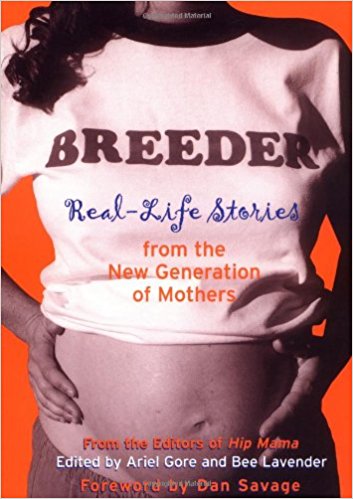
Breeder edited by Ariel Gore and Bee Lavender
A collection of stories of unapologetically “real” parents touching on the good, the bad, and the ugly sides of parenting. I need to take a moment to shout this out: this book was one of the first “punk/alternative parenting” books I had ever read and ultimately what made me know that I’d eventually be a parent. It also made me realize how shitty it is when friends and peers act like shitheads about parents, which is something I had done for so long. We get it, you’re soo cool and free because you don’t have children “ruining your life.” Go on, remind us of our life failures while we “build a new foundation from the bricks you threw [our] way.” We are humans facing struggles and carrying the next generation of the world on our shoulders. You will not take that power from us.
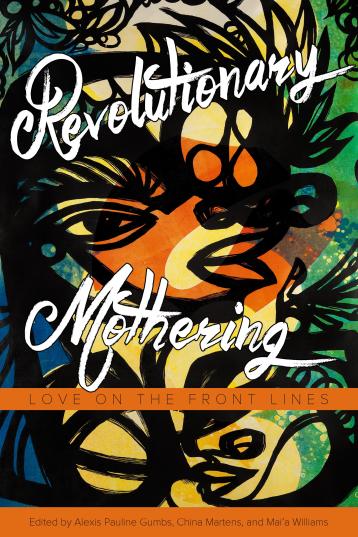
Revolutionary Mothering edited by Alexis Pauline Gumbs, China Martens, and Mai’a Williams
This book is fierce and raw but full of hope! Revolutionary Mothering does an AMAZING job of giving a voice to marginalized groups: people of color and individuals in poverty. Both are such underrepresented groups of people and need to be heard and given power.

The Hip Mama Survival Guide by Ariel Gore
If you’re looking for “real talk” this is it. This was a book I had read prior to that bundle of cells taking up residence in my uterus. While this book is from 1998, it serves as a judgment-free parenting resource, which is incredibly refreshing. Ariel touches on a lot of different topics, so the segments are brief but well worth the read!
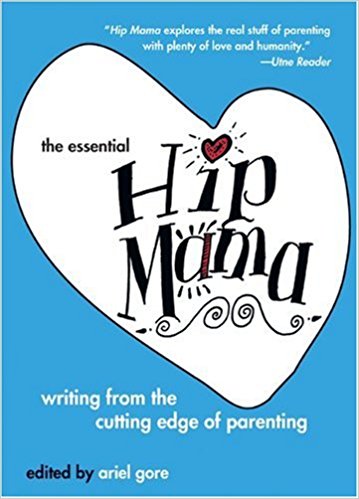
The Essential Hip Mama: Writing from the Cutting Edge of Parenting by Ariel Gore
This is another collection of works from various parents who provide the honesty and vulnerability that we all feel as parents. I hate to sound redundant, but it is something we all need to read because the solidarity you feel from it will break your chains of self-doubt, I promise.
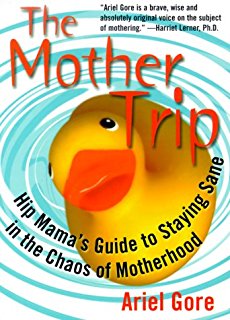
The Mother Trip: Hip Mama’s Guide to Staying Sane in the Chaos of Motherhood by Ariel Gore
I’ve included so many of Ariel’s books because they are such a joy to read and we all need that healthy dose of reality and feminism. A must read for those of us who broke the “mother mold” years ago.

Whatever, Mom: Hip Mama’s Guide to Raising a Teenager by Ariel Gore
This reads less like a guide and more like an empathetic, humorous approach to parenting a teenager. We all talk about new babies, but when the novelty of diapers and night time feeding wears off, what do we have to represent the parents of young adults? Growing children are a hard pill to swallow. AUTONOMY?! What do you mean you don’t need me anymore? I’m glad to see someone is talking about these things.
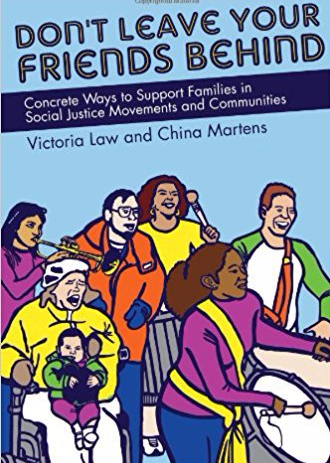
Don’t Leave Your Friends Behind edited by Victoria Law and China Martens
This book talks about the important fact that parenting does not automatically equate to abandoning your beliefs and interests. It also serves as a resource for those who are not parents, but have friends/acquaintances who are. Additionally, it even includes those who are not parents, but are full-time caregivers for parents or other non-children. Think about it, how can we expect children to care about our community if the community spaces make parents and their children feel unwelcome and burdensome? We need to hear the voices of the parents in our communities. Amariah Love wrote my favorite quote in this book, “Children need to have an established sense of community so that they carry those values throughout their lives.”
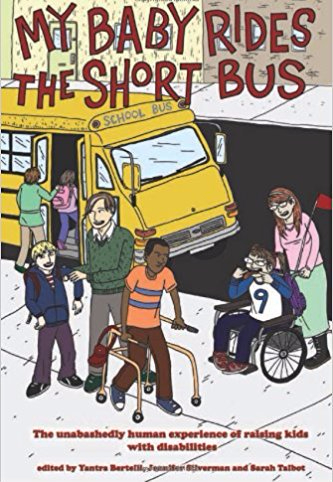
My Baby Rides the Short Bus: The Unabashedly Human Experience of Raising Kids With Disabilities edited by Yantra Bertelli, Jennifer Silverman, & Sarah Talbot
This book addresses the isolation, invisibility, frustration, and fears of parents who find themselves in a realm of parenting that is widely misrepresented and unsupported by their peers, families, and the media. One of my favorite lines from the book was from Maria June, who says, “Motherhood meets us where we lack imagination.”

Rad Dad Zine Compilation Issues 1-10 edited by Tomas Moniz
So I know this is a Punk Mamas blog, but I couldn’t leave Tomas Moniz out of this list because he acknowledges that we are ALL on this parenting journey in one form or another. This particular book is a compilation of the first 10 issues of Rad Dad zine.

Rad Dad: Dispatches From the Frontiers of Fatherhood edited by Tomas Moniz & Jeremy Adam Smith
Again with Rad Dad, another collection of stories. It is refreshing to see written proof that there are a multitude of fathers out there who are questioning the mainstream role of “dad” and parenting with intention, emotion, radical mindsets, and above all, a sense of humor.

Rad Families: A Celebration edited by Tomas Moniz
Family means something different to everyone because the ways in which we begin as parents or start families are all so different. This book is as the title suggests: a celebration of the diversity of families.
A few topics I found to be lacking, maybe not totally missing, but not largely represented: maternity activism, schooling, immigration, adoption, and child-loss. By sharing our stories and frustrations, we open doors to support, advocacy, and friendship. If you are ever feeling invisible, I encourage you to make your voice heard and scream until you shatter that barrier that makes you feel separate. We cannot become advocates for one another if we do not listen and offer our support to all punk parents and everything they face: the good, the bad, and the argyle.
